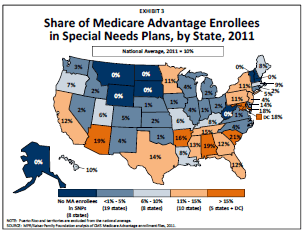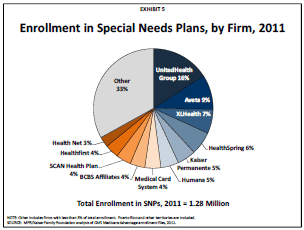This is the second post highlighting some key findings from the Kaiser Family Foundation’s September 2011 Data Spotlight on Special Needs Plans (a subset of Medicare Advantage plans). The first post focused on overall enrollment.
While enrollment in dual eligible Special Needs Plans (SNPs) has risen, the distribution of such enrollees is unequal, both geographically and across health plans. Around 2% of Medicare beneficiaries are in SNPs. However, there are 8 states in 2011 with no SNPs of any type, while 5 states and the district of Columbia have 15+% of their Medicare beneficiaries enrolled in SNPs. Around 80% of SNP enrollees are in dual eligible plans which are the most common type SNPs in all states where such plans are offered. The 8 states with no SNP enrollees of any type in 2011 are: Alaska, Montana, Wyoming, North and South Dakota, Vermont, New Hampshire and West Virginia.
In addition to geographic variation, a relatively small number of insurance firms are heavily involved in offering SNPs. Virtually all insurance companies had more dual eligible SNPs as compared to institutional or chronic condition plans, with only two insurance providers (see table A5 in the brief) having more patients in other types of plans.
The concentration of dual eligible SNP enrollees into a relatively small number of private insurance companies is consistent with a story of specialization of services to treat the complicated and numerous needs of dual eligibles. However, to this point, most dual eligible SNPs have not lived up to their potential. From the brief:
…coordination between the Medicare and Medicaid programs is more a goal than a reality, posing challenges for SNPs and for enrollees who receive coverage under both programs. While existing dual SNPs will be required to contract with state governments by 2013, it is not clear how this requirement will be implemented and how effective it will be…. Dual SNPs also face enormous challenges in providing appropriate services to enrollees with heterogeneous and often highly‐specialized and diverse needs, ranging from younger beneficiaries with debilitating mental disabilities to older enrollees, with physical and cognitive impairments, living in nursing homes or trying to maintain their independence at home.
The health and social needs of the dual eligibles are complex, and so far SNPs represent mostly unrealized potential in seeking to reduce the cost of their care while improving quality.
****
Marsha Gold, Gretchen Jacobson, Anthony Damico and Tricia Neuman. Special Needs Plans: Availability and Enrollment, Kaiser Family Foundation Program on Medicare Policy. h/t and thanks to Adam Coyne and Amy Berridge of Mathematica Policy Research for providing me with this brief and other information on SNPs.



